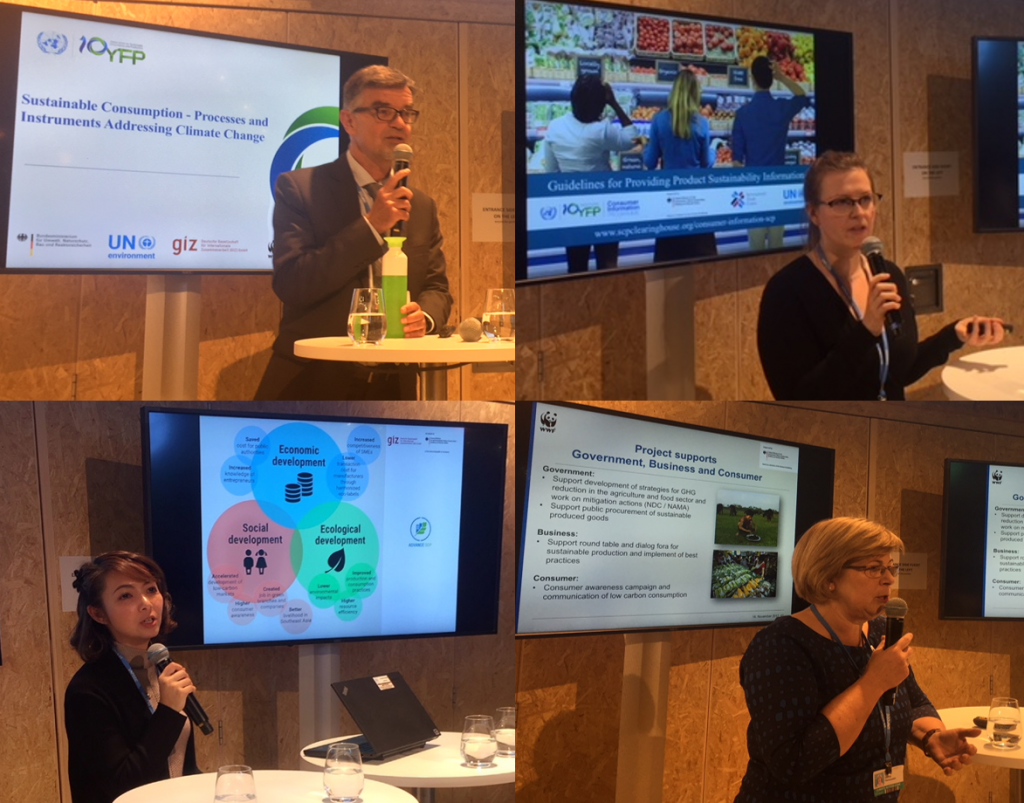At the conclusion of COP23 in Bonn, UN Environment, the German Federal Ministry for the Environment, Nature, Building and Nuclear Safety (BMUB), the German International Cooperation (GIZ) and World Wide Fund for Nature (WWF), presented on processes and instruments to address climate change from a consumption perspective. During the event in the German pavilion, Dr. Ulf Jaeckel from BMUB stated that “more than 70% of GHG emissions globally are caused by consumption decisions, thus the time is now to motivate consumers to adopt more sustainable consumption behaviours to tackle climate change.”
Germany is also supporting efforts at the international level, including through its International Climate Initiative (IKI) and its active involvement in the 10 Year Framework of Programmes on Sustainable Consumption and Production (10YFP). The latter is committed to developing SCP tools whilst building synergies and uniting institutions for joint work. One such example is the recently launched ‘Guidelines for Providing Product Sustainability Information’, created with inputs from over 125 organizations, in response to calls for international agreement and guidance on how to convey information on products’ sustainability attributes and performance to consumers. UN Environment and the International Trade Centre led this work that aims to inspire information providers to build upon the valuable efforts already underway, in line with SDG Target 12.8. It is currently undergoing a road testing phase.
Bettina Heller from UN Environment presented SCP activities in Africa and Latin America to address climate change through the IKI project Advance SCP. In Morocco, the project implements a methodology to measure the environmental footprint of hotels at country level and provides technical assistance to 10 pilot hotels to assess their resource efficiency baseline. The latter revealed that 60% of emissions were derived from use of air conditioning and heating. The implementation of action plans to improve those resulted in a 22% reduction in CO2 emissions and 10% economic gain per overnight stay. The hotels can communicate their performance through the below footprint, increasing guests’ awareness and helping them to make informed choices:
GIZ shared experiences from South East Asia to address climate change through Eco-labelling and Green Public Procurement (GPP). Kanchanatetee Vasuvat presented results from a project which sought to reduce GHG emissions through the integration of climate friendly criteria in GPP and successfully reduced 113,000 tonnes of CO2 as a result. This work is continued under the current IKI project Advance SCP in Thailand, Indonesia, Malaysia and the Philippines. Through the project, the four countries are also developing Nationally Appropriate Mitigation Actions (NAMAs) and supporting the creation of new markets for climate-friendly products.
Martina Fleckenstein from WWF Germany concluded the event with a presentation on the IKI project Establish Low Carbon Consumption and Production in Southeast Asia. The project supports governments, business and consumers to reduce GHG emissions in the agriculture and food sector. Martina highlighted the unique opportunity to explore the link between the SDGs and the Paris agreement, stating that “NDCs can become a powerful tool to develop climate mitigation actions in the food sector, to shift to sustainable consumption patterns.” Support and action in this area is needed: while 90% of the 169 submitted National Determined Contributions (NDCs) mention agriculture, forest or land-related issues, only 6% of NAMAs are for agriculture as of date.
The organizations will continue to work in this area and foster partnership to drive sustainable consumption to address climate change, through IKI projects and the 10YFP.
